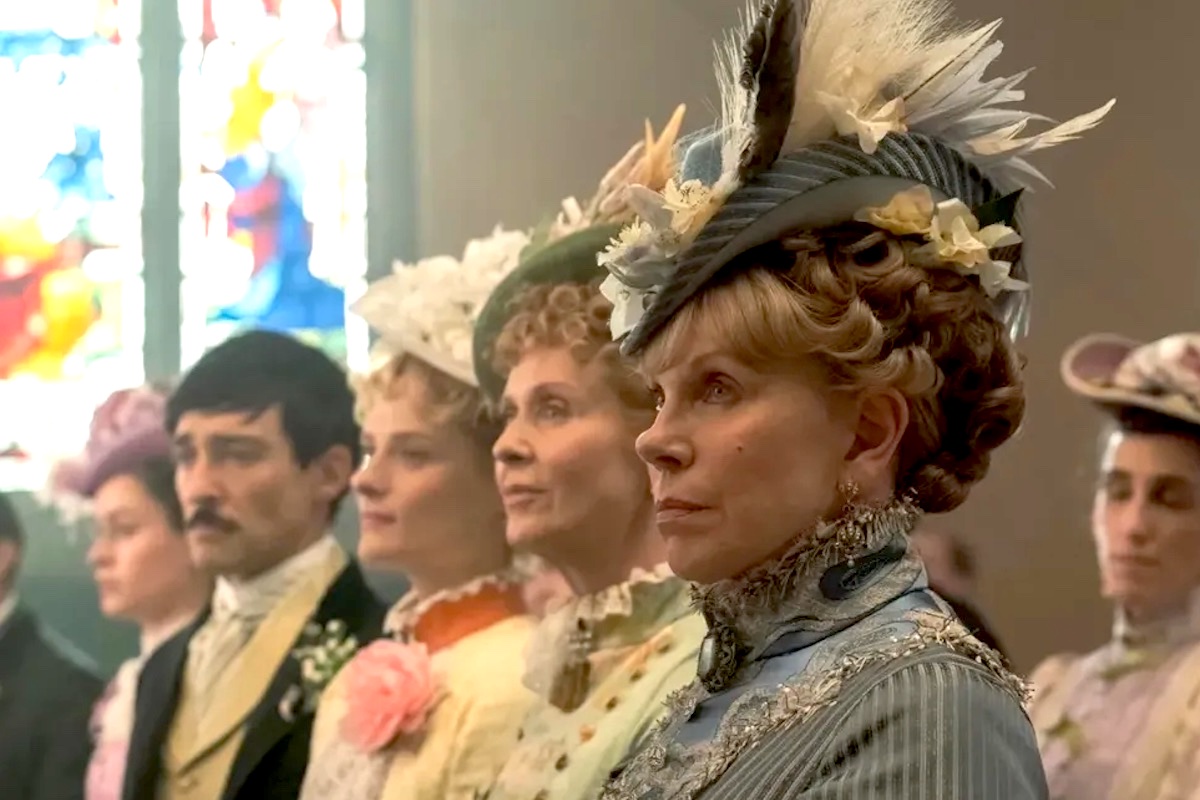Could This One Act of Kindness Save a ‘Gilded Age’ Matriarch’s Fortune?

As it turns out, con artists have always been a concern, at least according to the HBO drama The Gilded Age. At the end of episode 7 in season two, Oscar van Rhijn (Black Ritson) discovers he’s been conned out of most of his family’s fortune, leaving them dangerously close to being (gasp!) poor.
With no recourse, Oscar is forced to relay the bad news to his mother, Agnes van Rhijn (Christine Baranski), a haughty matriarch who has sacrificed a lot to be wealthy. As the camera zooms in to her face, you can see the fear etched into it. There’s no universe wherein Agnes van Rhijn could be working class. She’s old money, through and through, and that’s just how we like her.
When we first meet Agnes in season one, she comes off as the world’s biggest snob. She shuns the “new money” Russell family when they move in across the street and does everything in her power to keep them from ascending to her social circle. She rules her household with an iron fist, yet through her actions, we catch glimpses of a kind and compassionate person who hides behind a cool veneer of pretension.
For example …
One of the first things Agnes does in the show is take in her niece, Marian Brook (Louisa Jacobson), after her estranged brother (Marian’s father) passes away. With no money and no prospects, Marian would be utterly alone in the world without her aunt’s charity. Similarly, Agnes’s spinster sister Ada (Cynthia Nixon) would be destitute if not for her sister sharing her fortune.
There are other clues, too. Agnes may be condescending to her servants, but she is also unfailingly kind and fair with them. She addresses them by name, asks about their personal lives and wellbeing, and offers help when she can. She is also one of the few aristocrats who’d invite a Black journalist to work as her secretary and live in her home. She treats Peggy Scott (Denée Benton) well, defending her when lady’s maid Mrs. Armstrong (Debra Monk) takes aim at Peggy for no good reason. Agnes even asks after Peggy’s family and offers help during a difficult time.
There’s also the way she puts her own pettiness aside and rushes to Ada’s side when her new husband Luke (Robert Sean Leonard) falls ill. She’s a true friend, even if she acts like she doesn’t care about anyone or anything.
Last season, we learned that Agnes and Ada were left penniless after their parents died, forcing Agnes to land a rich husband in order to survive. The late Mr. van Rhijn was not a kind man and Agnes suffered abuse while he was alive, but she sacrificed her own happiness to provide the way of life she and her sister were accustomed to. Now, Agnes and her entire household survive on that hard-won van Rhijn money …
… and Oscar squandered it on a bad investment.
As the credits rolled at the end of episode 7, I found myself surprisingly anxious. Showrunner Julian Fellowes is a master of drawing audiences in and making them feel empathy for characters who don’t always deserve it, but thus far The Gilded Age has not captured that power as well as his previous opus, Downton Abbey—until now. For the first time since I started watching the show, I felt worried because things would simply not be the same if Agnes lost her fortune.
That’s when I remembered that Agnes recently made an investment of her own, one rooted in kindness and love for those around her.
Throughout season two, Agnes’s footman Jack Treacher (Ben Ahlers) has been trying to solve his alarm clock problem. After oversleeping one too many times, he starts tinkering and invents a new part for his clock that works like a charm. The other servants urge Jack to try to get his invention a patent, even ponying up their own hard-earned money to help him pay the $15 fee to apply for the patent. When Agnes hears what he’s up to, she hands him a five dollar bill and insists he take it.
Jack runs into a road block with the U.S. patent office, but once again his fellow staffers prod him to keep trying. By the end of the episode, he learns he’s been accepted into an horological society, which means he can reapply for the patent … and will most likely get one.
While Jack is a fictional character, Fellowes loves to borrow details from real historical figures. Jack is likely loosely based on American clockmaker Seth E. Thomas, who patented a small wind-up clock in 1876 that sold prolifically throughout the United States. If that’s true, I have a hunch that Jack’s clockmaking will pay off for him … and for one of his largest investors: Agnes.
Will the van Rhijn household be saved by her impulsive act of generosity? Only time will tell. We might have to watch Agnes suffer for a few episodes before this issue is resolved, but I’m hopeful that Jack will end up being the panacea Agnes and Oscar (and viewers!) desperately need. After all, as Agnes quipped in season one, “If you don’t want to be disappointed, only help those who help themselves.”
Season 2 of The Gilded Age is now streaming on Max.
(featured image: HBO)
Have a tip we should know? tips@themarysue.com